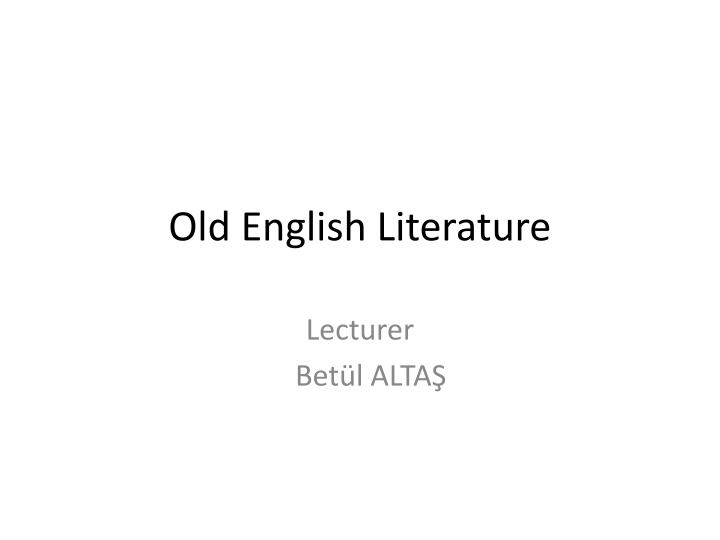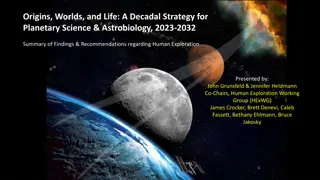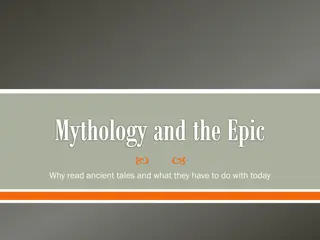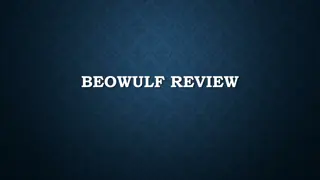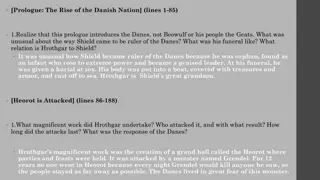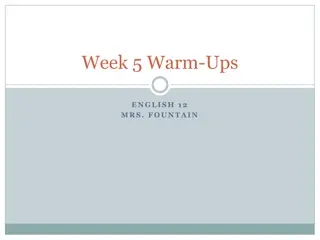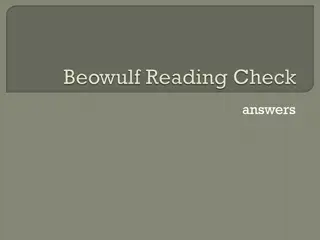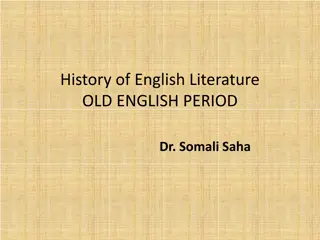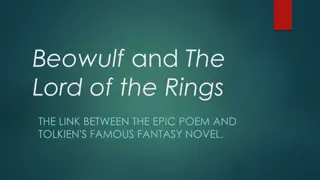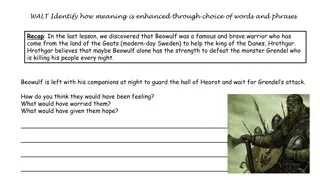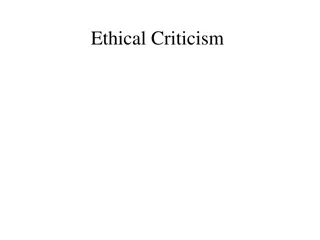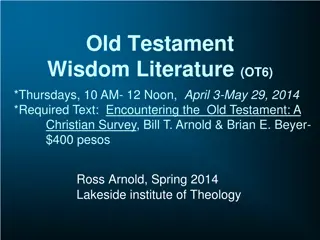Exploration of Old English Literature through Beowulf
Discover the roots of English literature through Beowulf, the oldest epic poem that delves into the adventures of heroic figures like Hrothgar and Beowulf himself. Uncover the essence of the Old English language and its impact on literary epics. Explore the themes of bravery, revenge, and mortality depicted in this ancient text.
Download Presentation

Please find below an Image/Link to download the presentation.
The content on the website is provided AS IS for your information and personal use only. It may not be sold, licensed, or shared on other websites without obtaining consent from the author.If you encounter any issues during the download, it is possible that the publisher has removed the file from their server.
You are allowed to download the files provided on this website for personal or commercial use, subject to the condition that they are used lawfully. All files are the property of their respective owners.
The content on the website is provided AS IS for your information and personal use only. It may not be sold, licensed, or shared on other websites without obtaining consent from the author.
E N D
Presentation Transcript
Old English Literature Lecturer Bet l ALTA
The old English language or Anglo-Saxon was the earliest form of English. Old English was spoken from about A.D 600 to about 1100. Beowulf is the oldest of the great long poems. It dates back to the seventh century.
Beowulf is English in language and origin, but the story deals not with native English men but with their Germanic ancestors (Abrams, 1996, p. 18). Beowulf which is composed of about 3000 lines is the first English epic.
Epic, a literary term Epic is defined as a long narrative poem. Epic poem includes history , the history of people or a race (Barton & Hudson, 1997). According to many critics, there are two kinds of epic: a) traditional epic (or folk epic) b) literary (or art) epic * epic
Epic, a literary term The traditional epic is an oral or anonymous poem. It focuses on the adventures of a hero who is important to a nation. The literary or art epic is a conscious imitation of a folk epic.
In this regard, the name of Beowulfs author is unknown. The story of the poem is not about English men, but about: * Hrothgar, king of the Danes * a brave young man, Beowulf from Sweden.
What the story of the poem is about: Grendel, a creature visits King s hall and kills his men. Beowulf helps king of the Danes and attacks Grendel. Grendel dies. However, the attacks restart when Grendel s mother comes to the hall to take her revenge. Beowulf wins the battle by killing her.
Afterwards, Beowulf, king of his people fights against a fire-breathing creature and he kills it. However, he dies because he is wounded in the fight. The story ends with a painful portrait of Beowulf s funeral fire.
Beowulf offers insights into: fierce fights brave deeds speeches of the leader suffering of the leader s men description of their lives in the hall their travels
There is no rhyme in Beowulf. Rhyme is used to identify the repetition of similar sounds in the poem (ending with two or more verse lines with the same sounds), such as: So gardens die, their meek breath scenting The cowl of winter, done repenting * rhyme
Organizing device of line is alliteration. Each half-line is joined to the other by alliteration. Alliteration the same sound such as: two or more words beginning with middes beorge maerne bael *alliteration
Other Old English Poems Genesis A Genesis B is about: * the beginning of the world and the fall of angels * God s punishment of Satan * place of punishment for evil in the hell *angel *hell
Other poems taken straight from Bible Exodus (about how Israelites left Egypt and Daniel). Christ and Satan Juliana The Fates of the Apostles Christ Elene four of them were written by Cynewulf. * Apostle
Other Old English Poems Andreas and Guthlac Dream of the Rood (rood refers to the Christ s cross) Old English Lyrics *Lyric: a short poem, originally one meant to be sung. Deor s Complaint The Husband s Message The Wanderer The Wife s Complaint *lyric
Other Old English Poem The Battle of Maldon (about the fight, against the Danes) There are words of courage in the poem. Old English prose comes later than Old English verse. *prose : ordinary written language, not controlled like verse.
Most Interesting Piece of Prose Anglo-Saxon Chronicle (an early history of the country) King Alfred (848-901), translated Latin books into Old English, had a great influence on this work. Homilies (990-4) written by Aelfric. Lives of Saints (993-6) *homily: religious talk * saint: holy man
Aelfric wrote out in Old English (first seven books of the Bible). His prose sytle is the best in Old English and uses alliteration. *style: writer s special way of using language.
